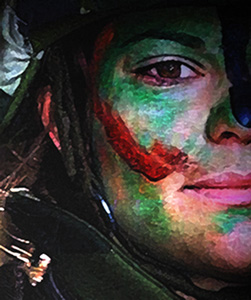They had my grades, my prior address. They knew I was moving from an army barracks, that I was a likely candidate. The Captain called me every day. He offered scholarship money, career possibilities. I wanted things the way they were, moving every three years. I liked the sound of cadence in the morning. My husband Sean had wanted out, wanted to go back home, to live near his parents. I didn’t have a home. I believed in putting my money where my mouth was. I signed the papers in Wills hall, shook the Captain’s hand. Later, there would be a swearing in, but first I was given a trunk load of gear: uniforms size small-short, web belt, gas mask, canteen, helmet. I unloaded in the driveway. What are you doing with my stuff? Sean asked. He was still in the reserves. Not your stuff, I explained. I shoved everything into the duffel, slammed the trunk. Oh no, he said, what have you done? What have you done?
I was a third year. I had trouble making weight. When I stepped on the scale, I left on my boots so I wouldn’t be too skinny. The others had already been to basic camp the previous summer. They had their cliques. The girls camo-sticked each other’s faces as if they were touching up each other’s make up. I did it like the guys, by feel, checking in a handheld mirror that was passed around. We marched for hours in the darkness, going in circles, our boots crunching gravel. The duffel was over half my weight. The helmet kept falling down over my eyes. When it was time to bivouac everyone was already paired off. I stood with my shelter half looking at the moon. The sergeant showed me how to rig it with sticks. I had just fallen asleep when the shouting started, the gunfire, blanks that sounded real. I will not fire my weapon, I thought. I didn’t want to clean it. I will not fire my weapon. But I did, stumbling over the dead leaves, uncertain which direction I was supposed to be headed.



 The core workshop of SmokeLong Fitness is all in writing, so you can take part from anywhere at anytime. We are excited about creating a supportive, consistent and structured environment for flash writers to work on their craft in a community. We are thrilled and proud to say that our workshop participants have won, placed, or been listed in every major flash competition. Community works.
The core workshop of SmokeLong Fitness is all in writing, so you can take part from anywhere at anytime. We are excited about creating a supportive, consistent and structured environment for flash writers to work on their craft in a community. We are thrilled and proud to say that our workshop participants have won, placed, or been listed in every major flash competition. Community works.